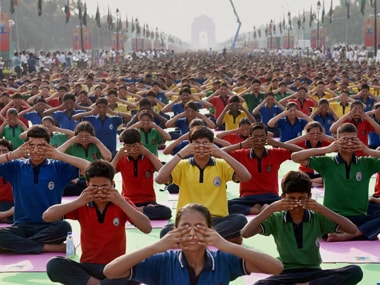The World Health Organisation (WHO) signed a first-of-its-kind agreement with the Indian government on Friday to develop a global protocol for promoting traditional and complementary medicines (T&CM) – by providing reference documents for governments to regulate and integrate such systems of knowledge into national health regimes. The Indian Ministry of Ayurveda, Yoga, Unani, Siddha and Homoeopathy (AYUSH) has committed to provide technical and financial support to WHO, to develop “benchmark documents” for Ayurveda, Panchakarma, Unani, and Yoga. India will provide US $0.97 million (Rs 6.45 crore) against staggered outcomes to the UN health agency for the agreement that runs up till December 2020. [caption id=“attachment_2764582” align=“alignleft” width=“380”]  Representational image. PTI[/caption] At present, there are no WHO basic requirement documents for regulating practice and training to ensure the quality, safety and effectiveness of international disciplines and therapies in T&CM. “The Project Collaboration Agreement that was signed today will develop for the first time basic WHO benchmark documents for training and practice of different Indian systems of medicine,” said Ajit Kumar, Indian Ambassador to the UN office at Geneva. “T&CM need rigorous, scientific data to demonstrate their efficacy. It needs guidelines in good manufacturing practices. It also needs evidence-based standards,” said Dr Marie-Paule Kieney, WHO Assistant Director-General for Health Systems and Innovation. “The two systems of traditional and western medicine need not clash,” Kieney said, praising India’s attempts to mainstream AYUSH under the National Rural Health Mission. “India and WHO will seek to improve the quality and service delivery of Indian systems of medicine and help in their better acceptability internationally,” said Shripad Yasso Naik, national AYUSH minister after the signing of the agreement. There is an increasing appetite among national governments to strengthen their traditional systems of medicine – the number of WHO member states who put together national policies on traditional medicine have increased from 25 to 69 between 1999 and 2012. “The limitations of public health systems based on a single approach or a single medical discipline are becoming rather evident,” Naik said. The UN had undertaken some initiatives in the recent past to better integrate traditional systems of medicine with the mainstream health narratives. The WHO passed a resolution in the 2014 health assembly initiated by China called WHO Traditional and Complementary Medicine Strategy: 2014-2023 to help member states build their knowledge base, promote universal health coverage by integrating T&CM into national health policies, regulate products, practices and practitioners related to such disciplines, among other objectives. India had co-sponsored the resolution. The UN agency had also established an International Regulatory Cooperation for Herbal Medicines (IRCH) – a global network of regulatory authorities responsible for the global regulation of herbal medicines. Next IRCH meet will be hosted by India in November, 2016. The UN has also declared 21 June as the International Day of Yoga. This agreement has been quite a few years in the making. Discussions on the possibility of a collaborative agreement between WHO and the then Department of AYUSH began in 2006, with the establishment of two Indian institutes on traditional medicine as WHO collaborating centres in 2013. “It is a landmark agreement because it adds global acceptability to AYUSH systems. The major drawback right now is a common protocol. This is the beginning of many more such collaborations of WHO,” Ajit Sharan, AYUSH secretary, told Firstpost. The Department of AYUSH was elevated to a dedicated ministry for traditional medicine in November 2014. The government has signed MoUs on traditional medicine with nine countries – Nepal, Bangladesh, Hungary, Trinidad &Tobago, Malaysia, China, Mauritius, Mongolia and Turkmenistan – apart from having Ayurveda chairs in the four countries of Thailand, Indonesia, Slovenia and Russia. The agreement would subsequently lead to a “long-term collaboration” with the UN health agency involving multilateral collaboration in T&CM, including development of basic terminologies, establishing a database for global T&CM practitioners, establishment of a network of international regulatory cooperation for traditional practice, for preserving, protecting, and promoting the bio-resources, traditional medicine and folklore knowledge related with these systems. The Cabinet approved this a long-term collaboration with WHO in February this year. “We are not saying that AYUSH is superior to others but requesting the people to try this (system of medicine),” Naik told Firstpost. Every medicinal system, including AYUSH, has its strengths, and promoting alternate systems of medicine “empowers” and “expands” the choices available to the patient, he added.
WHO signed a fist-of-its-kind agreement with Ayush ministry to develop a global protocol for promoting traditional and complementary medicines (T&CM)
Advertisement
End of Article


)

)
)
)
)
)
)
)
)



